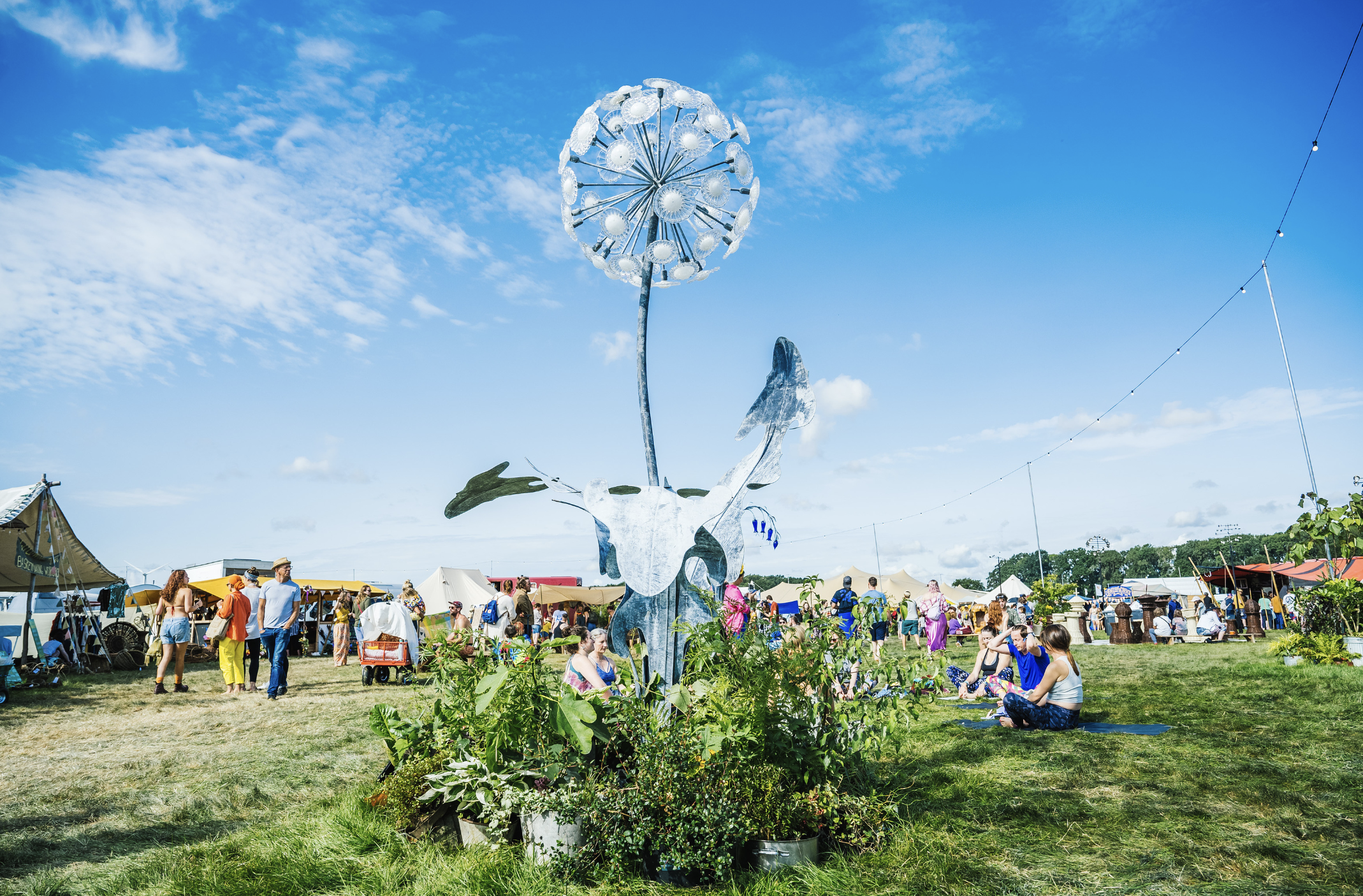Shambala 2023 in Numbers
like never before…
Welcome to our 2023 Impact Report, our latest foray into the figures behind the festival.
And it’s a biggie…..
We’ve made some huge leaps and bounds into new territory, looking further, wider, and deeper into the data than ever before! We’re committed to total transparency – because it helps us think about how to lower the dials on our consumption, impact and how we do things.
It takes all of us folks involved in organising and enjoying the party to contribute towards our liveable future; the crew, artists, audience, suppliers and beyond. So thank you for helping us on the journey!
Note: This report is interactive and animation heavy – if your computer doesn’t like that, or if you just fancy having it in a more simple and shareable pdf format, we’ve got that too – find it here.
2023 Highlights
The Good News: Top 10
- We encouraged 1,000 people to take our NEW rail & entry packages for the first time.
- We increased public transport to the festival by 10% to 35% of festival goers – we’re happy with this.
- The travel emissions footprint from audience cars & camper vans decreased by 10%!
- .Our onsite energy emissions reduced by 13% (per person per day).
- We measured the full footprint of the food served at Shambala for the first time – a whopping 52 tonnes CO2e!
- We used 2,600 litres less bottled gas for our traders and showers.
- We sent 13.5 tonnes of festival food waste (2.5 tonnes more than 2022) to a local farm, which will be composted and used to grow food for next year.
- We’re a core member of an European consortium of 43 festivals exploring what being circular really means for festivals.
- Shambala won some awards(!); the Surfers Against Sewage Plastic Free Festival award (UK) and the international Clearwater Award.
- Our team did a deep dive on climate justice, and we have an action plan coming for 2024, turning words into action.
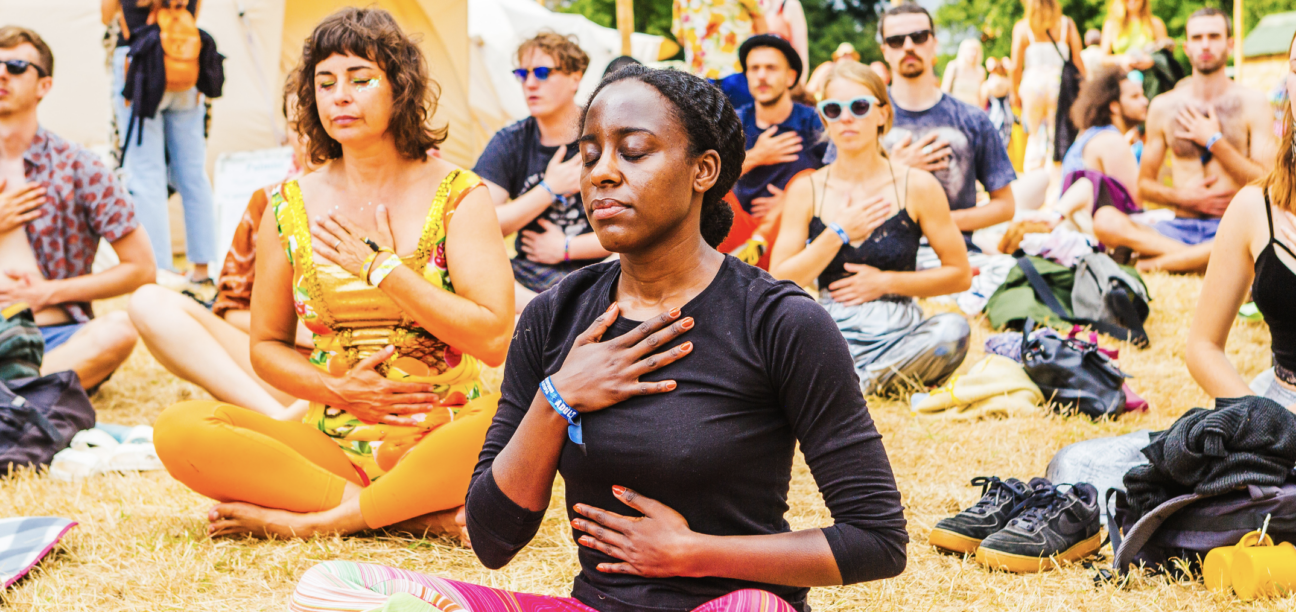
The Kind of Good and bad News
Our overall carbon footprint has increased, compared to last year – in fact trebled. The increase is due to changes in the data we have collected and the methods we use to measure impact. Read on to find out more…
But the good news is, this is because we measured more, to give a more in-depth picture of our impact. Our three-year strategy set out to measure a wider ‘scope’ of our festival-related emissions, to understand more fully our impacts beyond the festival itself. We see this as a real positive, as we’re truly mapping the full impact of running events, just like a city or society would and must.
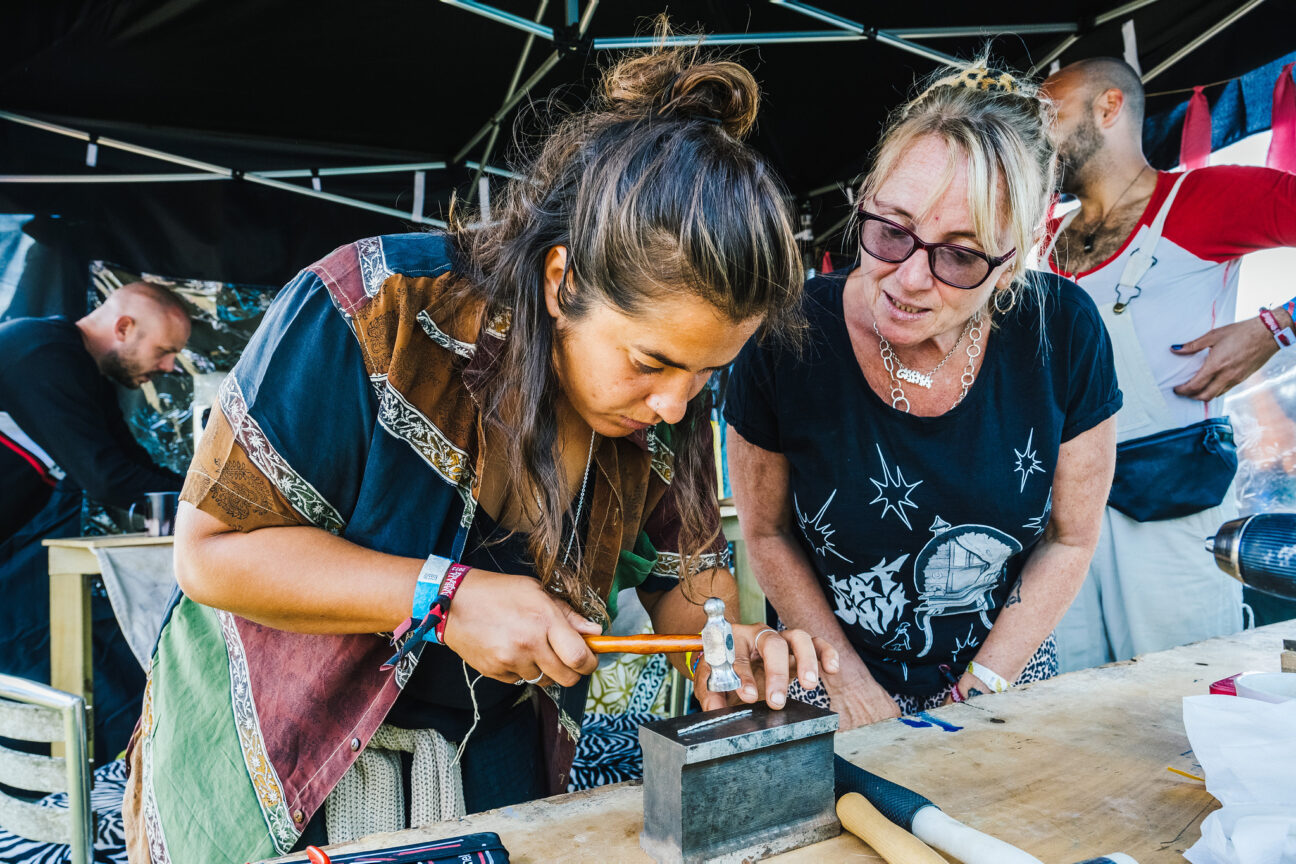
The Less Good News
Our total energy use increased slightly – the grid energy (which feeds in from a renewable tariff) and the hydrotreated vegetable oil (HVO) we use as fuel for vehicles and generators went up. We set out to reduce energy use by 5-10%, but didn’t manage it this year.
We still didn’t crack our carbon food labelling. We’d like to have all food traders label the CO2e of each dish they serve – but this was tricky as the software doesn’t have all special ingredients Traders used, and squeezing info onto menu boards was challenging. In future, we are really interested in whether this would influence people’s food choices.
Our recycling rate actually decreased. We are struggling to know what to do next! We have plenty of compost caddies for campers to use to avoid heavy, juicy organic food waste going into general waste – where it’s burned for energy (not very efficiently). We’d prefer to capture more compost and send it to our Community Supported Agriculture farm partner – so prepare yourselves for more action in the campsites next year!

Carbon Footprint
Our total carbon footprint has rocketed compared to last year…. but don’t panic! This is because we’ve measured more than ever before. We are getting more granular on data and wider in scope, to better understand our full impacts, at the festival and beyond.
Here’s how things looked in 2022, compared to this year.
2022
2023
Festival-related emissions have leapt up this year because we’ve measured more than ever before!
New data includes:
➕ Third party travel emissions including artist travel,
➕ Transport of all our infrastructure,
➕ Food & drink related emissions and impacts,
➕ Crew and suppliers’ travel,
➕ Life cycle emissions of materials and waste,
➕ Emissions of the materials we purchase.
*Source – Creative Climate (Julie’s Bicycle) and Green Deal Circular Festivals (GCDF) carbon assessment tools.
Carbon Footprint Per Person Per Day:
Our total footprint (above) is a useful metric, but how does this relate to us as individuals? Below is the amount of CO2 equivalent for each person who built and enjoyed it, each day.
It’s increased, for sure, but it’s still less than the daily average in normal life. Hurrah!

Energy
We’ve been powered by 100% renewable electricity onsite for years! With renewable biofuel in our generators, plus a grid connection using green tariffs (5% of energy). The final thing we need to tackle to become entirely fossil-fuel free as organisers is LPG gas used by cafés for cooking – watch this space!
Our fuel use per person, per day decreased from 0.30 to 0.26 litres – which is nearly 50% below the industry average of 0.5 litres for greenfield camping festivals. We made this figure more meaningful by including all fuel use this year, rather than just the generators i.e. also the fuel used for all machinery and vehicles onsite.

Waste
We produced 79 tonnes in 2023:
We’ve worked hard over the years to initiate all sorts of recycling and waste schemes, from the first festival Recycling Exchange with public hand-sorting to Trashzilla the mobile, electric-powered, garbage-guzzler which prowled the campsites gobbling waste…
But we are really struggling to improve our recycling rates! Our amazing waste partners are among the most committed and experienced recyclers, but like any society, city, or settlement – we’re only as strong as our people – so it really does take all hands on deck, separating waste together.
♻️ In 2024, be sure to separate out your food waste for composting – so it avoids creating worse emissions as part of general waste!
Our greatest challenge going forward is figuring out as a community how to reduce that 41 tonnes of ‘general waste’ – i.e. how to boost the percentage of our waste that is recycled contamination free!
Materials
We’ve also been working with an amazing waste consultancy called Rubbish Ideas to map our “Materials Flow”. This will include everything we put in to the festival, and everything that comes out. This is very exciting and will help us prioritise and improve on different material streams. It’s a work in progress – watch this space for more soon!
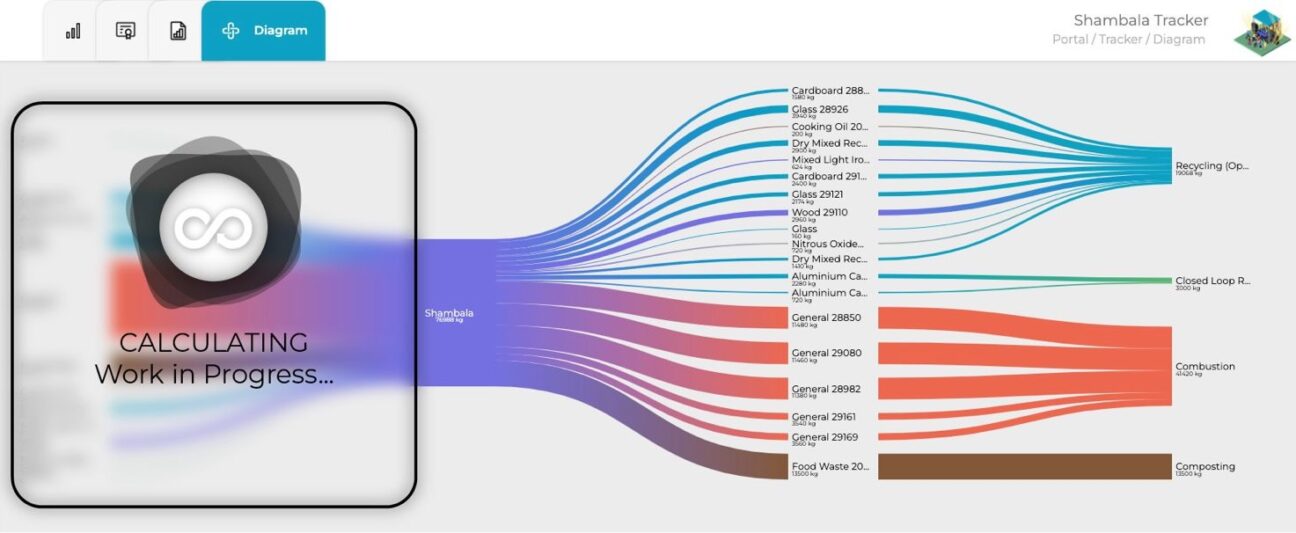

Food & Drink
For the first time ever we captured the impact of all the food served at Shambala, and now have our food footprint! By measuring the amount of ingredients, and the impact of each dish – we added together all food sold by our amazing food trucks and our incredible crew catering and mashed it into one simple carbon serving.
Food accounted for 6% of total our emissions.
Less than the impact of the materials we bought, but more than our energy.
How can we improve on this?
We’re already meat and fish free, which was a huge step for our footprint and for influencing audiences. So, we’re working with our food traders and crew catering to:
- Develop an ambitious food policy which mandates certain elements and sets targets on obtaining more local, seasonal, sustainable produce.
- This includes an exciting regenerative agriculture plan developed with consultants and partners to try to dial down our use of far-flung, high-impact ingredients like rice and the few remaining dairy products in some dishes.
- Encourage the use of our vetted whole-salers onsite – we’ve worked with organic workers collectives to provide fresh fruit and veg, a local zero-waste refill supplier (available for public on site too!), to provide packaging-free dry foods and cleaning products, and sourced eggs from a local, actually free-range farm.

Meat Fish and Dairy
In 2016 we removed meat from the menu. This helped us prevent an estimated 100 tonnes of greenhouse gas emissions from the festival’s carbon footprint each year. Here’s how our audience is feeling about this at the moment:

Travel
Although we’ve added lots more specificity to our overall festival footprint with new metrics…. travel and transportation still remains the largest piece of the impact pie.
At 60% of our over all emissions, there is a real opportunity here for us to work with you lot; our crew, partners and artists to reduce these figures in future years through public transport options, lift sharing and clever logistics.
We introduced rail & entry tickets for the first time, and more people arrived on public transport than ever before – more than 1/3 of you! Thank you! In the future, we want this number to increase and increase. Let us know if there’s anything we can do to support you.
Here’s how different members of our community travelled to the festival.

Community Impact
With your donations, our Pay It Forward campaign welcomed care-experienced young people and local families for the first time this year, folks who would not have been able to experience festival culture in this way otherwise. They had a great time, and we’ll be working with local organisations to expand this wonderful project in 2024.
The Shambala green story so far…
Since Shambala was born, at the turn of millennium, we’ve put social and environmental issues at the forefront, centre-staging a liveable future.
We’ve grown-up alongside the festival, and realised our responsibility to contribute to the industry we found ourselves in. We’ve been collaborating with like-minded folk in the sector, sharing data, experiences and expertise to better navigate the festival work from a sustainable perspective.
1999

2001

2002

2004

2007

2008

2009

2010
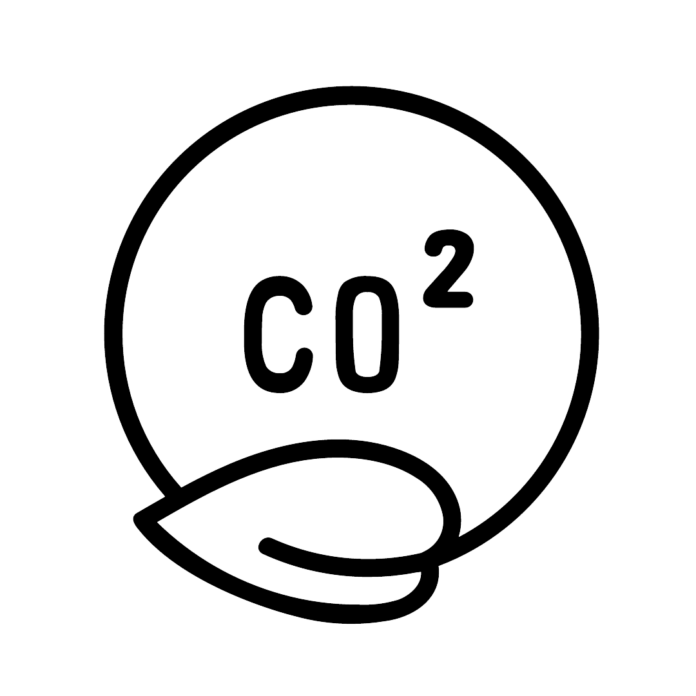
2012
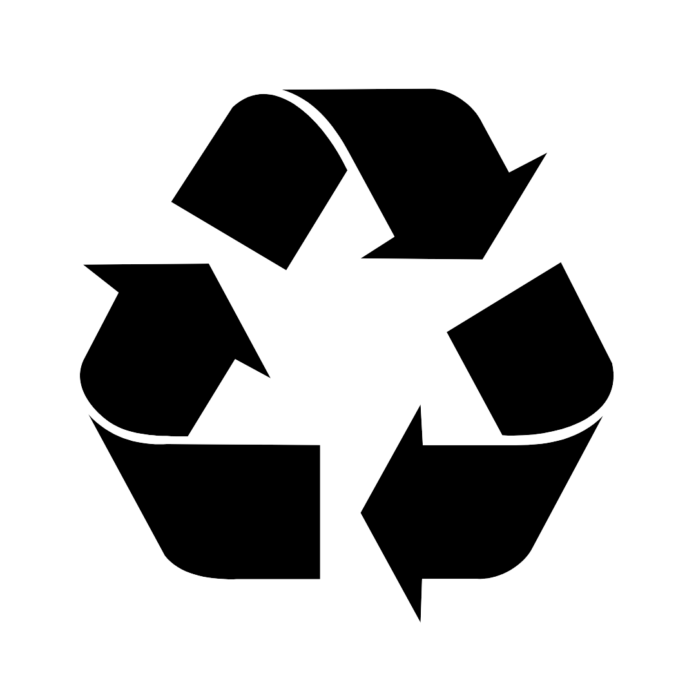
2013

2014

2014

2015

2016

2017

2017

2018

2019

2020 (no festival!)

2021 (Shambino)

2022
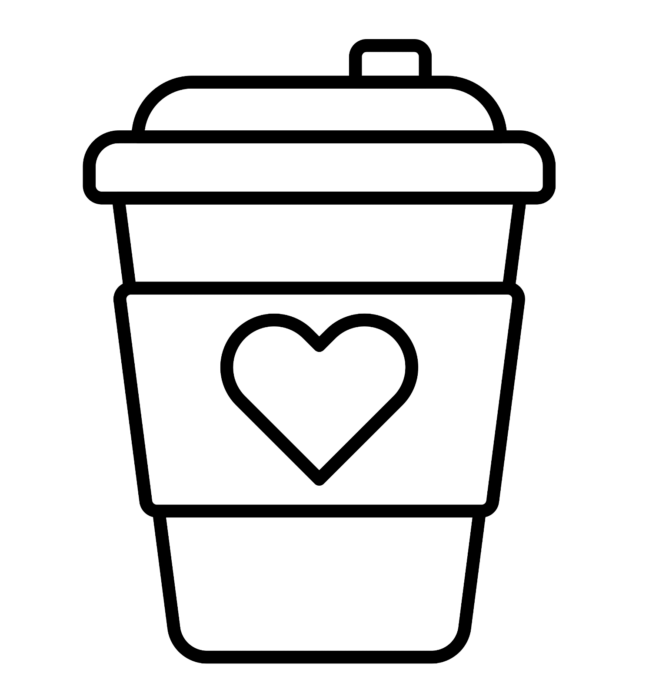
2023

2023

Responsibility
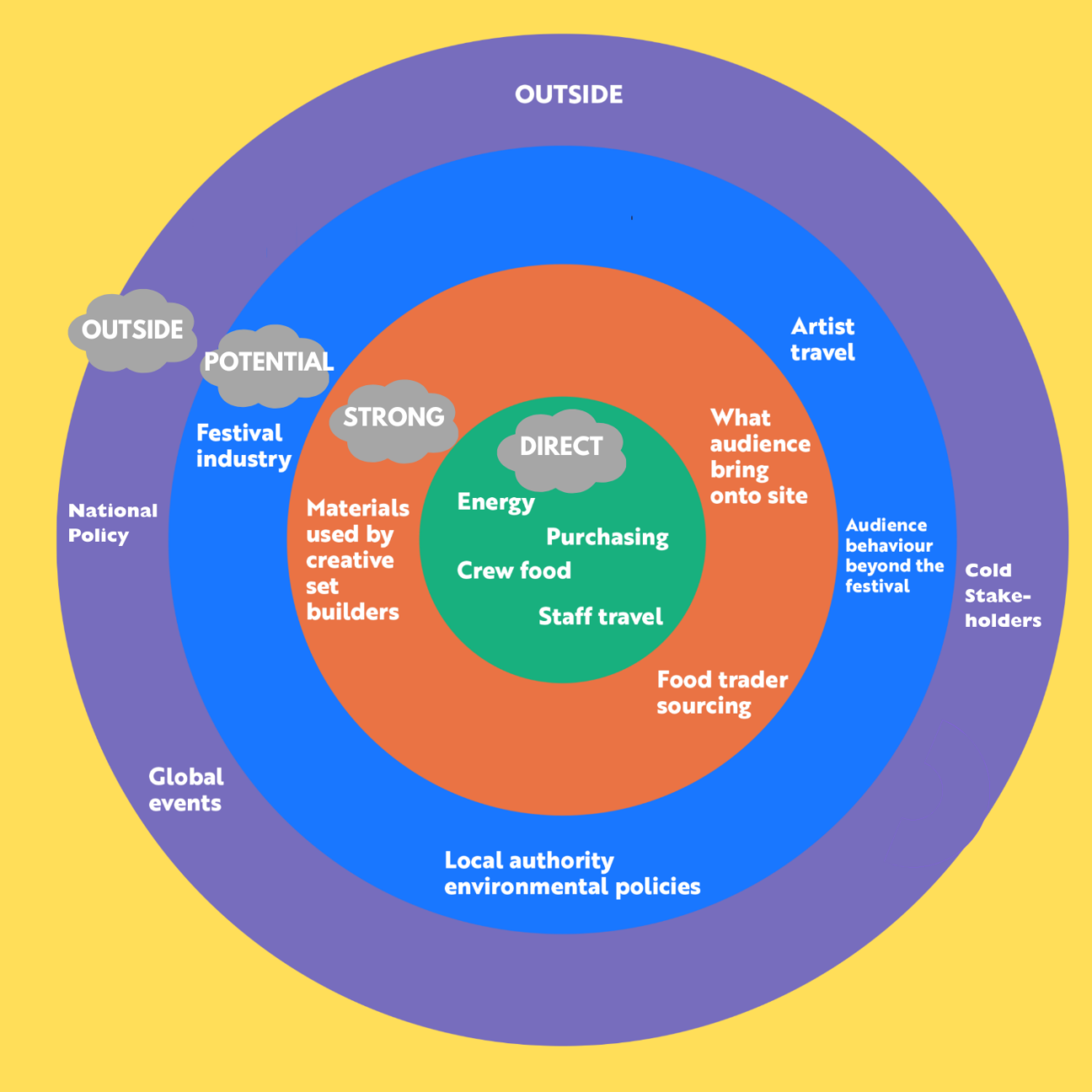
Boundaries of Influence
As a festival event, with many moving parts – defining our ‘boundary of influence’ on our community and contractors is tricky. But we’ve been working for years on how to have a positive impact on the members in our wider community – in order to provoke greater environmental and social consideration in business.
We have minimised so many of the negative impacts of delivering the festival ourselves – as this is clearly our direct responsibility and within our control. We also work with hundreds of partners, from big top providers, security staff, food suppliers and more. We are looking to review this process and ensure we’re working with the best, most ethical providers and encouraging others to improve their standards.
Additionally, the influence we can have within the transformational effect of mindful festivals, such as being meat and fish free and removing disposables can spark changes in audience members’ lives. We have proven that we can inspire people to adopt new ideas and behaviours once the festival is over, and use this as a guiding principle.
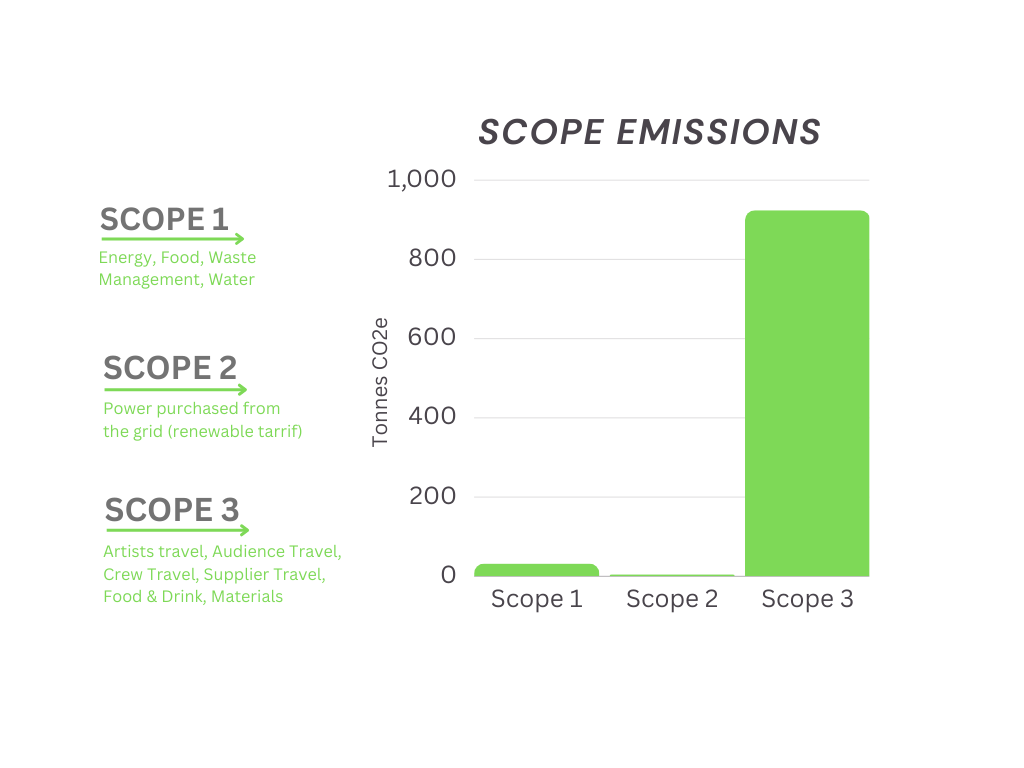
Scopes of Responsibility
We approach our responsibility for emissions using internationally recognised frameworks, which highlight 3 ‘Scopes’ of emissions:
Scope 1 = direct emissions from an organisation’s activity
This is the energy we use to building run the festival, the crew food, water and onsite vehicles. We are directly responsible for reducing this year on year, and offsetting unavoidable emissions (which we have done for over a decade with investments in renewable energy).
Scope 2 + 3 = indirect emissions caused by the activities of the organisation
In 2023 we’ve mapped Scopes 2 and 3 in more detail than ever – supplier artist and crew travel, plus the materials and our food.
As you know, £1 and £3 is added onto the purchase of every car and camper van pass. This year, our audience balanced 327 tonnes of carbon with an investment of £8,199 through Ecolibrium in ecosystem protection and restoration, including verified offsets.
Next, we will be discussing behind-the-scenes how to encourage our community to reduce their emissions, how to get smarter on logistics, how we can better support our Crew and how much we should offset until these dreams become a reality.
What we’re aiming for
As times change, we realise that Shambala has to go beyond sustainable; to become regenerative, circular, net positive, life-respecting, fair, and future thinking. This is the ethos behind our actions.
We released our 3 Year Green Road Map in 2022. We set ambitious and trail-blazing goals across our governance, energy use, material management, food and drink and our transport options, and we’re looking deep into supply chains and the communities involved.
We also made a commitment to understand climate justice and put this at the heart of our actions. We have been through a process of learning, and are proud to launch a manifesto and action plan early in 2024.
We have reduced the festival’s footprint drastically over the past decade and achieved 100% renewable electricity onsite, become meat and fish free, eradicated single use plastics and encouraged over a third of audience members to come in public transport. But there is always more to learn and do! Here are our targets for the next 3 years:
Focus Areas & Actions:

Carbon footprint
Source biogas for cooking – not easy!
Remain net positive through climate investment (scope 1).
Encourage more people to arrive on public transport (including crew and artists).
Understand and audit our full supply chain and company practices.

Circular economy
Design out new materials from the festival build.
Measure the impact of our build including infrastructure and transportation.
Increase recycling rates through community campaigns and innovation.

Regenerative food
Explore the possibility of a delicious, totally plant-based menu.
Ensure all meals are under the One Planet Plate 0.5 kg CO2e limit.
Work with local, small-scale regenerative farms.
Source the majority of food and drink from within 200km of the festival.
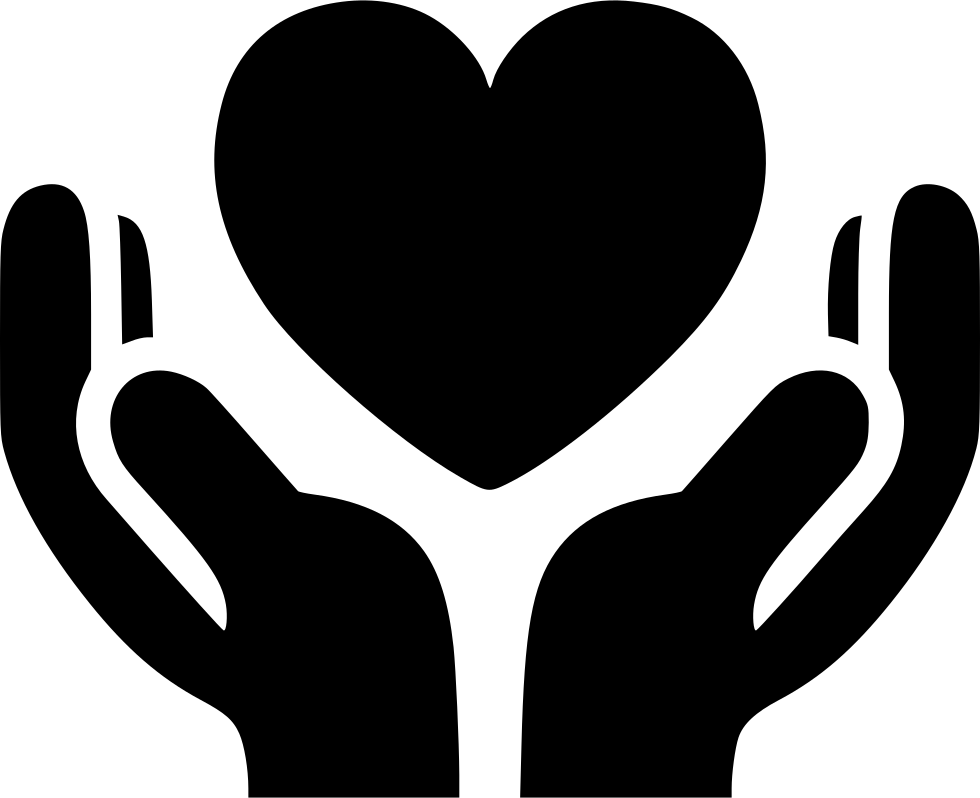
Positive influence
Influence everyone in our community and beyond; audiences, artists, crew, food traders and suppliers, to take actions to make conscious choices for their businesses or art, to map their impact, and to create targets for improvement.
What can Shambalans do to help?
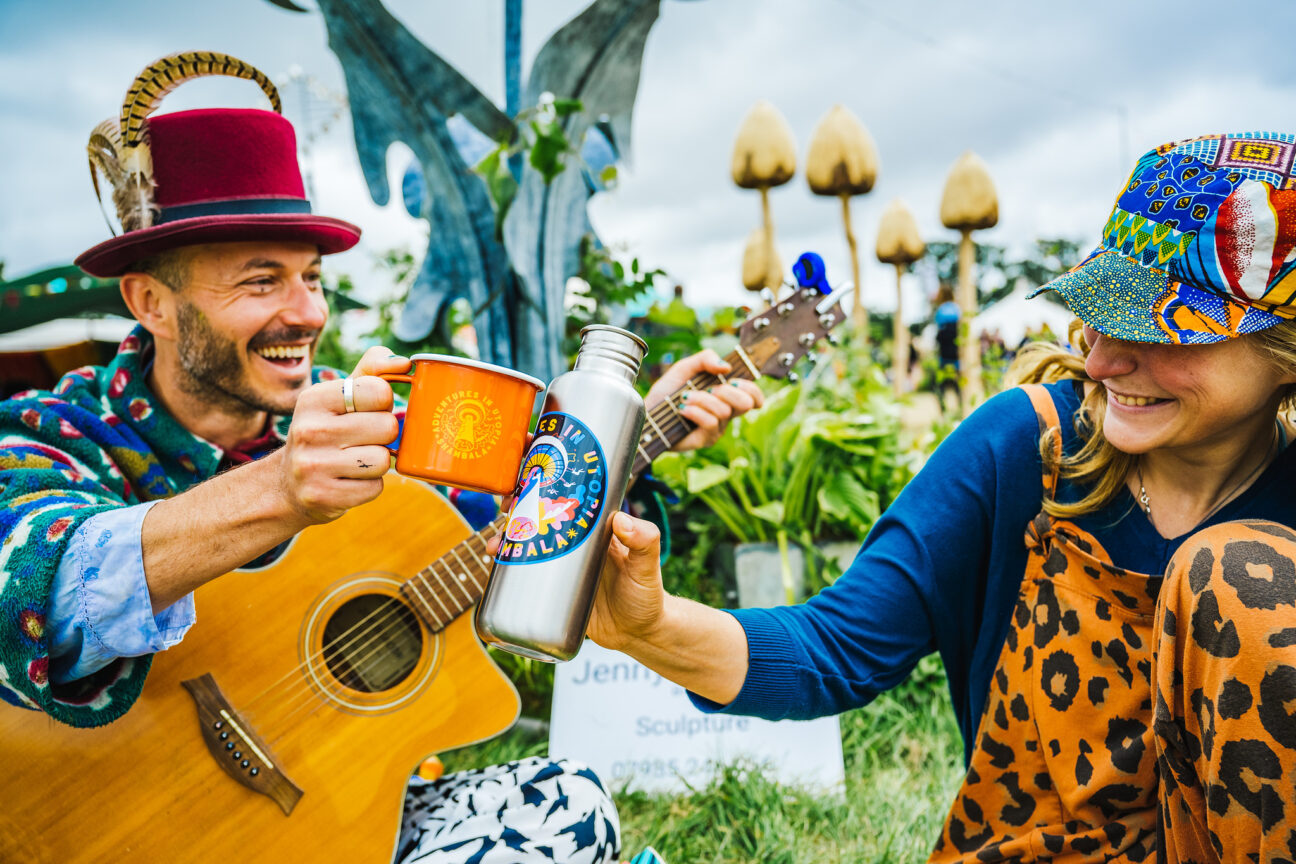
Battle disposable culture
We were ahead of the curve, removing plastic bottles from our fields in 2014. Then, in 2019 we banned single-use, plastic-lined coffee cups and everyone brought their own. We’ve been providing reusable bar cups since 2013. We do the same behind the scenes, with reusable plates and cutlery in crew catering, wholesale oat milk provided to all food traders across site in glass bottles, and soft drinks across bars served from bulk containers.
We’ve trialled reusable plates and cutlery, but for over 20,000 people across 4 days – we don’t currently have a way of delivering this that works well. For now, we use only plant-fibre, ‘’home-compostable’’ plates with wooden cutlery which is composted at a local farm after the show. We don’t permit “bio-plastics” or “biodegradable” stuff as it’s basically greenwash – because it needs bigtime commercial processing to degrade properly and it contaminates plastic recycling. Though we’re part of European event think tanks currently discussing algae “PHA” based plastics!
How you can help battle disposable culture with us:
To help us in this complex battle against convenience and disposables when you’re at Shambala you could:
- Avoid bringing too many plastic wrapped snacks, bread and fruit which are often left behind and can contaminate general waste.
- Collect up soft, flexible (scrunchable) plastics and return them to the supermarket. Show them we mean business on plastic-action!
- Instead check out our on-site, zero-waste van which offers delicious treats, or our on-site bakery or fruit & veg store which has all the fresh produce you’d want every day.
- You might even like to bring your own lunchbox and cutlery set, for your delicious meals from our amazing plant-based traders. There’s plenty of water on site to rinse and repeat! You can even bag yourself a Shambala wood and steel lunchbox set, here.
- Of course, separating recycling carefully on site will help us do our best with the waste we produce.
- Feel free to cook on site with your friends in your campsites! Just please keep your culinary waste as clean, tidy and separate as possible – using the clear grey and green bags provided.
- Be conscious of waste! And
- compost, compost, compost on site….
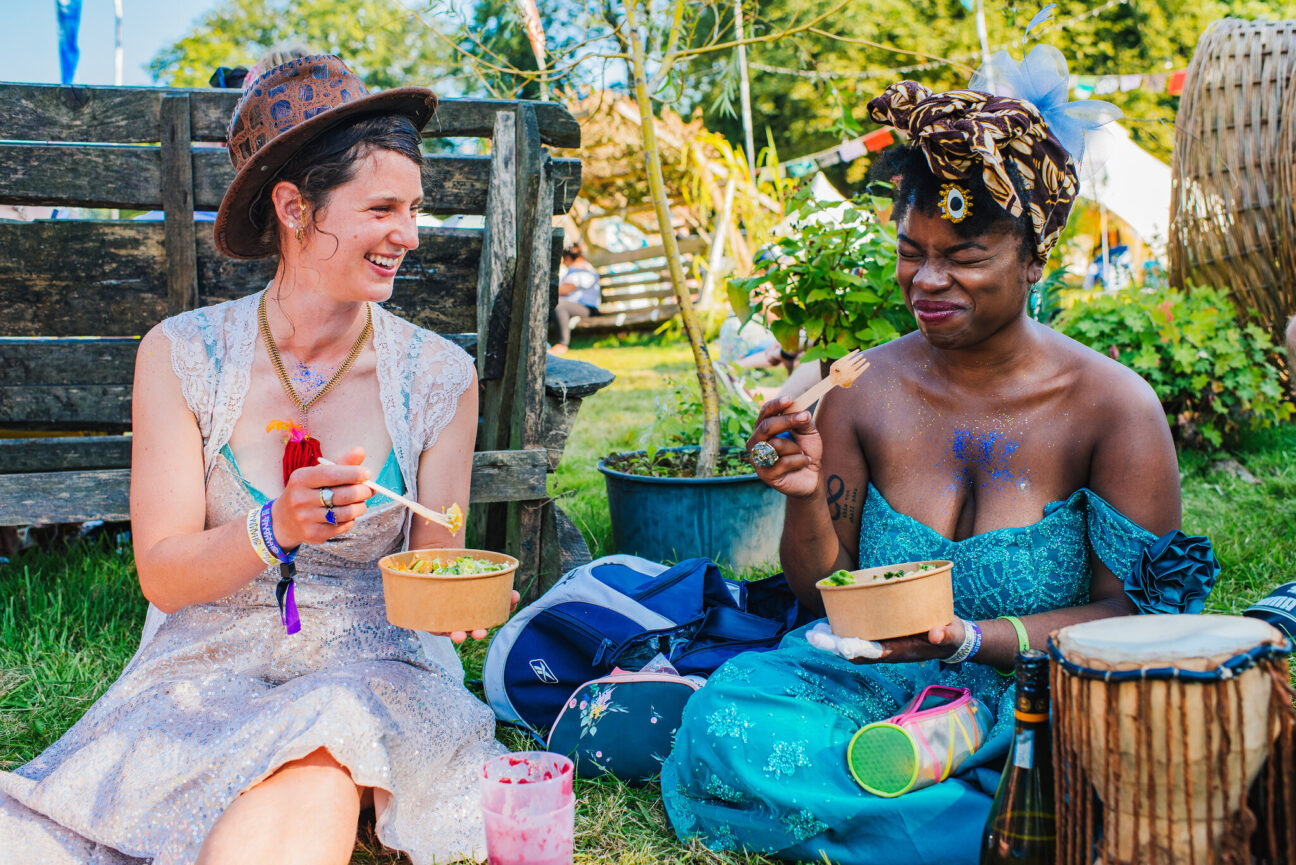
Waste
Waste is top of our list for focus, because sadly we didn’t make mountains of change this year. We nudged down the average waste from each person for each day of the festival by (a modest) 3% to 0.75kg for each Shambalan per day. We have achieved zero waste to landfill for 2 years, with anything unrecyclable going to create energy from waste.
But we still have 41 tonnes of general, unrecycled waste going to incineration for energy. This is less efficient energy than other sources, and could be better. We need to remove these unrecyclbale materials from our lives as humans, to create circular cycles which reuse materials and reduce waste.
How you can help improve waste management with us:
On site, there’s a few helpful things you can do to contribute to the community and improve how we handle our waste:
- If everyone grabbed a compost caddy from the campsite hubs to keep their organic food waste in during the show, our General Waste would weigh tonnes less.
- General waste is burned to capture energy from the waste, but with food waste, we’d be better off collecting it to turn into compost and putting the energy back into the land.
- Aim to keep your recycling clean to avoid contamination. Give yogurt and hummus pots and things a rinse, and empty bottles of liquids to ensure recycling is successful.
- Collect up soft, flexible (scrunchable) plastics and return them to the supermarket. Show them we mean business on plastic-action!
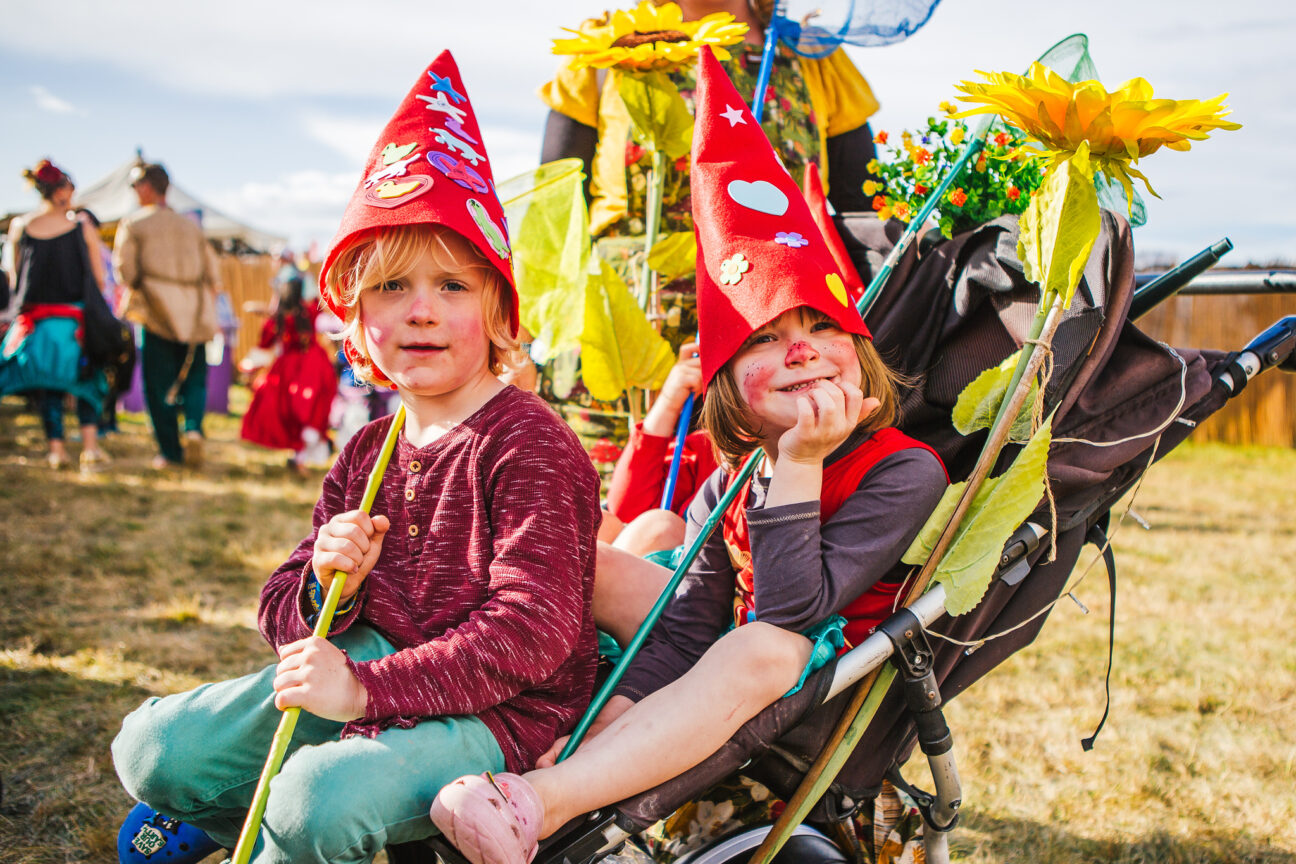
Travel and transport
This year we sold a few more car passes and a few less campervan passes. But excitingly, 10% more people travelled on shared transport, and people shared more car space than ever before. Overall that’s a drop of 5% per person on travel emissions.
Our new Rail & Entry packages were snapped up by 1,000 Shambalans, helping to increase our overall public transport use to 35% of the audience. Well done you lot! We’re also looking into more public, shared transport for our wonderful crew who help build the festival.
How you can help improve our travel emissions:
- Choose public transport. Our coach and rail packages make this easier and should save money on fuel and will save emissions.
- Pack light, and prepare to squeeze into vehicles. Aiming for 4-5 people per car would be incredible. Make a stop or two to stretch all those legs!
- Let us know if there’s anything holding you back, or any ideas you have to improve on travel emissions. The world of 2050 will have far less private transport, so we’ve all got to get our thinking hats on!
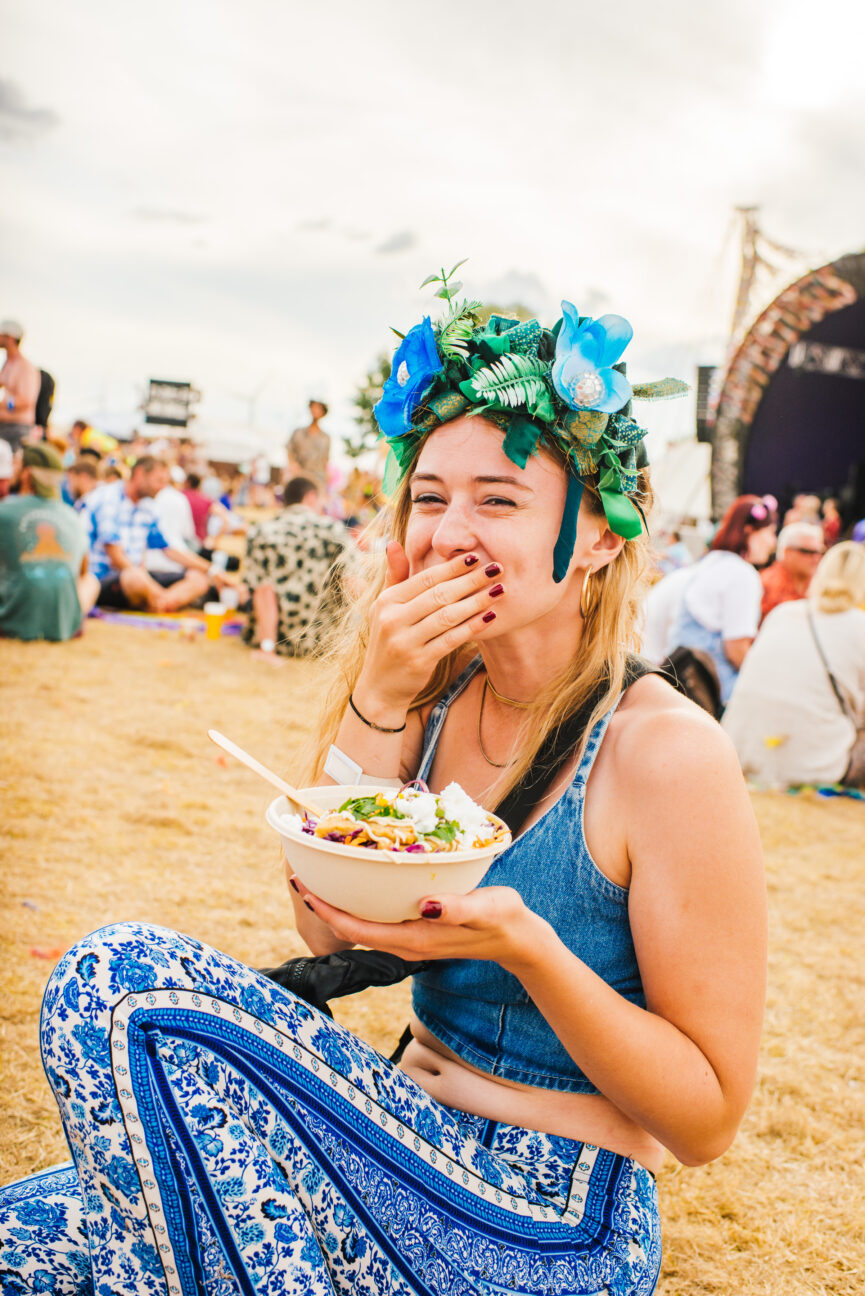
Food
Food systems and choices rank in the top 3 actions we can all take to avoid catastrophic global warming PDD. So we’ve always focused hard on this topic.
For the first time ever we mapped the entire carbon-emissions-equivalent of all food served on site at Shambala. This was a huge task, and meant lots of detailed liaisons with our traders and chefs! But we got there! Across traders and crew catering food create 54 tonnes of CO2 equivalent, and 0.54 kgs CO2e per dish. Nearly within the One Planet Plate directive which asserts that each full sized meal should be no more than 0.5 kg CO2e to keep the global warming challenge manageable OPP.
How you can help improve our food related emissions:
- Consider your cuisine: Our meals are already quite low impact, and we’re working on reducing the higher-impact ones by substituting any dairy or far-flung items like rice. Think local, and seasonable as you shop.
- Normal life: Thinking like this at home help ripple the impacts of our food focus out into the world.
- Focus on: plant-based, local and seasonal produce to help reduce humans’ reliance on far-away, exotic ingredients and bring more low-carbon, community produce into our local areas.
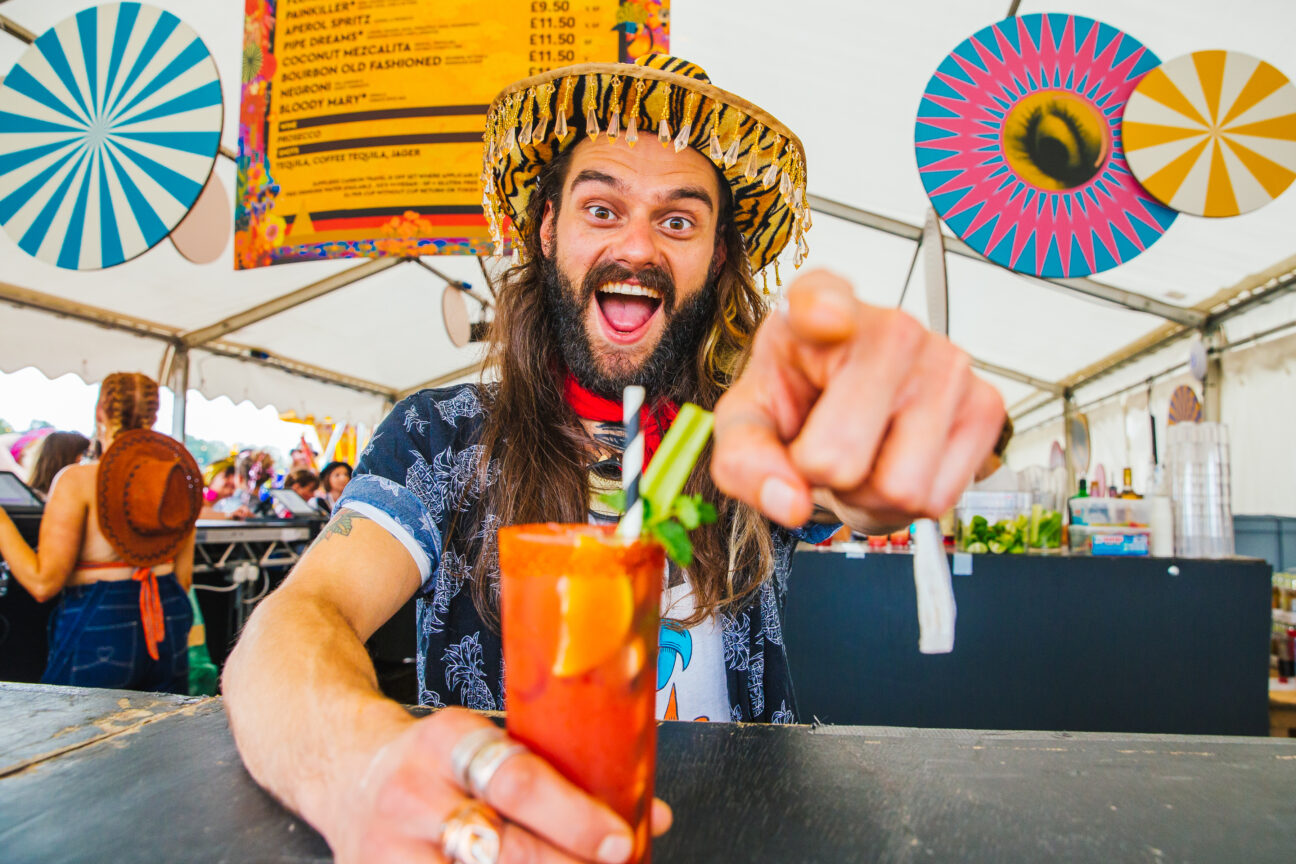
Drinks
Our bars are carefully curated to provide the most conscious, planet-friendly supply of sauce for Shambalans. We carefully vet our suppliers choosing local, small-scale, sustainable companies.
97% of our drinks come from within 200km (it’s mainly the soft drinks that don’t) and our lagers are sourced from Helles, Purity and other small-scale suppliers. 92% of our beer is now vegan, and 80% of wines (damn those sulphites!)
How you can help improve our drink related impact:
- Please return the cups! They are made of plastic, and if they are not reused they are more carbon-intensive, and polluting that thin single use ones.
- Drop them in CUP bins in the Arena or at the Cup Amnesty points on the way out.. just please don’t take them away as they need to be returned.
Community projects and partners
❤︎ Pay It Forward: Share The Love. This is our first year of the Pay It Forward initiative which raises for full festival access packages (tickets plus travel, camping and food) for folks on low income. With the £10,000 donated in 2022 through website and bar donations we welcomed a handful of families for the first time this year. Care-experienced young people aged 16 – 25, plus families from the local town came along and had a great experience thanks to your donations. We’ll be expanding this in 2024 – with an additional £12,000 raised for the Pay It Forwards pot in 2023. Thank you so much – keep those donations rolling on the bars this year!
❤︎ You may have noticed loads of prayer flags fluttering out of the Shambala Stage. Our ‘Flags For..’ invites Shambalans to sponsor the flags for a different cause or campaign. This year we chose The Flying Seagull Project, which brings play, theatre and laughter to children in the harshest environments around the world, from refugee camps to asylum shelters, hostels, care facilities and deprived community spaces. Read all about that campaign, and it’s impacts, here.
❤︎ Over 600 incredible Oxfam stewards donated their time to raise money to fight poverty and provide disaster relief in worldwide projects.
❤︎ Our MyCause volunteers donated their time to raise funds for their chosen charities, including: Autism Alliance UK, Bristol Refugee Rights, Coppafeel, Devon Rape Crisis and Sexual Abuse Services, Sea Shepherd UK, Stonewall and War Child.
❤︎ The heart of activism at Shambala is in Rebel Soul – whose on site café raises money for grass roots activism campaigns.
❤︎ Temwa raised money through providing phone charging services on site, which will go towards various Malawian projects that support people and environment.
❤︎ 100% of public car and camper travel emissions were balanced with Ecolibrium, helping to initiative renewable energy projects and plant treses around the world.
❤︎ Our stainless steel water bottles are supplied by RAW Foundation. RAW Foundation will use funds raised to continue campaigning against pointless plastic.
❤︎ Our merch team raised much needed funds for Bansang Hospital through the sale of our programmes.
❤︎ All profits raised by the sale of Love Specs at Shambala, helped Love Support Unite empower communities in Africa through sustainable development, education and healthcare.
❤︎ The Flying Seagull Project provided entertainment in the kid’s area, raising funds to spread happiness with young people in refugee camps across Europe and the Middle East.
❤︎ WaterAid provided some lush toilets for us this year and raised money to provide people across the world with clean water, decent loos and good hygiene.
❤︎ We popped a squat with the amazing squatting urinals from Peequal.
Research
This year we had the pleasure of working alongside:
✎ Green Deal Circular Festivals project: We’re one of 50 European festivals working to lead on green initiatives and share knowledge. The aim is to build a model for a circular festivals and events. The reporting platform is monstrously thorough, which has lead us to some new emissions and materials related revelations this year.
✎ Rubbish Ideas: We are working with this awesome company to meticulously map out our input and outputs, and draw up a materials flow analysis – on the journey to circularity.
✎ One Resilient Earth – we are very grateful to this group of folk here helping us dive into the challenging topic of Climate Justice. We will release a manifesto for 2024 to help us focus on how we can address Justice as a central theme in our work with the community.
Community partnerships:
✎ Our main focus for taking action at community level at the moment is on food. We want 80% of our food to come from local, organic, regenerative sources. The intention is to encourage others to avoid the convenience of consumer culture in supermarkets and online orders, to instead choose to support small-scale local farms which are regenerating the land, soil, water and air as they grow.

The future…
You can check out our Green Road Map for where we’re headed in the coming 2 years. Keep an eye out for our 2024 initiatives in the Essential Guide before you head to site next summer. But for now, here’s a sneak peek at some of our main aims for 2024…
People
- Increase and grow our amazing Pay it Forward: Share the Love campaign to widen access for low-income folks.
- We’re focusing on Climate Justice, and what this means for our community. We want to have this topic at the forefront of our conversations, creativity and commitments – to help spread wisdom on how to inhabit this earth equitably, for all peoples.
Planet
- Our recycling rates aren’t budging. We need more help! Your help…. We’re going to work on more food composting on campsites.
- Introducing bio-gas for cooking would be a dream, to take the last vestige of fossil fuels out the fields! We’re awaiting innovation, which is possibly just around the corner! Fingers crossed.
- We will increase public transportation links more and more, especially and specifically for crew in 2024. As over 30% come from Bristol!
- We are deep diving into our supply, to map transportation emissions, sourcing and business. We will review our criteria for working with these partners and hold businesses to account.
- We are ready to undertake a comprehensive supply chain audit and review our criteria for working with partners. We want to make sure the companies we work with are actively improving the environment, focusing on diversity, and providing a Living Wage.
- The future see us sourcing the majority of our food for traders and crew from within 200km of site. We’ve already done this with our drinks!
- We are dying to filter our waste water, removing transportation emissions from carting it off site.
- Finally, and excitingly, we are making the events company behind Shambala (Kambe) a certified B-Corp – ensuring we are a business for good through and through!
Beyond 2024
With your help, we’ve already made huge leaps and bounds as a community for protecting people and planet during the party. But we need to shift our perspectives and practices and usher in a new epoch of egalitarian living that is mindful of the climate, ecological and justice crisis.
Thanks to each and every one of you that who has contributed to this incredibly wonderful and fluffy community of Shambalan’s that have made us one of the most sustainable festivals in the world!
Find out more about what we’re doing on the website here: Sustainability.


